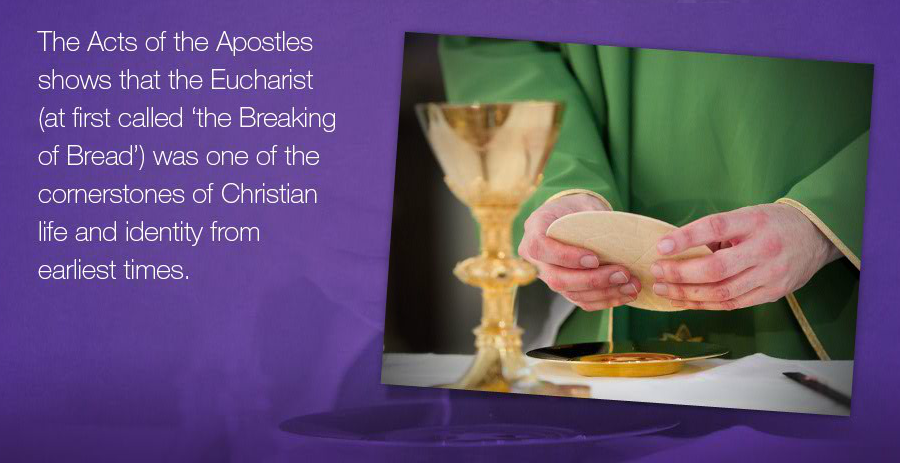THE ORIGINS OF THE EUCHARIST
The ritual we call the Eucharist was being celebrated by Christians before the New Testament scriptures were formed.
The Letters of Paul, written between the year 40 and the year 60 speak of the tradition of the celebration of the Eucharist originating in the words and actions of Jesus at his Last Supper which were passed on to him and which he in turn passed on to the communities he established.
The Gospels of Matthew, Mark and Luke recount the meal Jesus shared with his disciples the night before he died in which he associated the actions and words of that meal with his death on the cross on the following day. The Eucharist celebrates and represents this same mystery throughout the ages of the Church. John’s account of the Last Supper has a different emphasis but Chapter 6 of his gospel contains an extended reflection on the meaning of the Bread of Life which is deeply Eucharistic.
The Acts of the Apostles also shows that the Eucharist (at first called ‘the Breaking of Bread’) was one of the cornerstones of Christian life and identity from earliest times. While the first context for the Eucharist was an actual meal, Paul’s Letters show that, even by the mid-first century, the Eucharistic meal was separating from an ordinary meal.
Christianity grew from Jewish roots, and the development of the Eucharist was influenced by Jewish prayer and practice, especially the offering of praise and thanks to God and the liturgical understanding that when the great events of salvation are celebrated ritually, for example at Passover, their power and reality are extended into the present and are immediately available to each person.
The New Testament texts as well as being based in Jesus’ words and actions at the Last Supper were influenced by the words and actions of the first Christian communities as they celebrated the ritual that Jesus gave to his own on the night before his death.
The basic shape of the Eucharist is established in these early texts: bread and wine are taken, thanks and praise are offered to God over them, the bread is broken and the bread and wine received by all. All experience the presence of Christ with them as they eat and drink the Body and Blood of the Lord.
The basic meaning of the Eucharist is also established in the texts of the scripture: the Eucharist proclaims and makes present through the ages the mystery of the Life, Death and Resurrection of Jesus Christ.
For Reflection and Discussion
1
How would you describe the connection between Jesus’ words and actions at the Last Supper and his Death on the following day? Why do we say that the Eucharist ‘proclaim[s] the death of the Lord until he comes’ (1Cor 11:26)?
2
Imagine and describe a celebration of the ‘Breaking of the Bread’ before the year 50.
3
Why might Jesus have chosen bread and wine as the way in which he remains present to his church throughout history?
4
‘The Eucharist makes the Church; the Church makes the Eucharist’ (H. de Lubac). What does this saying tell us about the relationship between the Church and the Eucharist? Could one exist without the other?
Further Resources
WEBLINKS
BOOKS
Dimock, Giles O.P., 101 Questions and Answers on the Eucharist, Paulist Press, 2006
McMichael,Ralph, Eucharist: A Guide for the Perplexed, T & T international, 2010








